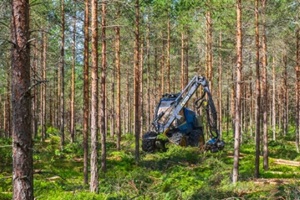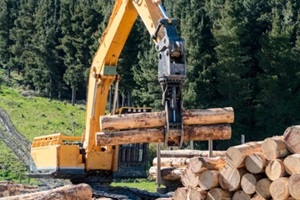
Forestry companies rely on their workers to face risky and potentially dangerous situations every day to get the job done. However, these workers would only get accomplished with their equipment.
From the chainsaws that fell trees to the trucks that transport them to mills and other destinations, forestry companies need to utilize potentially dozens of unique and industry-specific machines to accomplish their goals. Forestry equipment insurance is more effective when considering insurance coverage to protect these assets.
Here is an overview of what types of hazards equipment insurance can cover, what machines are most commonly included in policies, and how to ensure your business complies with the requirements necessary to enjoy the most comprehensive coverage.
What Does Forestry Equipment Insurance Cover?
Forestry equipment insurance has two main prongs of protection: reducing or eliminating the financial repercussions when a piece of equipment needs to be replaced and paying for repairs when a machine has been damaged but not destroyed.
The costs a business must endure when equipment is damaged or ruined might extend far beyond just the piece of machinery itself; missed deadlines, slowed work production, and sourcing and shipping new materials or machines can all burden the project.
Forestry equipment insurance seeks to mitigate this challenge by covering these events so the company can stay on track. It may pay for repairs as quickly as possible or assist with the financial cost of shipping or driving a new machine to the work site ASAP so that the project can continue uninterrupted.
Because forestry equipment can cost tens of thousands or even more for a single unit, companies should invest in comprehensive insurance coverage to shield them from the out-of-pocket financial repercussions of such a loss.
What Types of Forestry Equipment Does Insurance Cover?
Forestry equipment is diverse thanks to the wide range of potential tasks a company may need to perform. Some professionals focus on the earliest stages of forestry work, such as surveying and logging.
Others target the later stages of processing, including wood planing and chipping. While an insurance policy is often customizable to include specific types of equipment, the most commonly covered are:
- Wood chippers
- Grinders
- Forwarders
- Log loaders
- Delimbers
- Feller bunchers
- Saws
- Wood planers
Smaller tools, such as chainsaws, may also be included in the policy. Always be sure to read the inclusions carefully.
Exceptions and Requirements of Forestry Insurance for Equipment
Each insurance policy is unique, and it is essential to carefully review the specifics of any policy you are considering for your business. Generally, most forestry equipment insurance will mandate that the company follows specific rules and may exclude some equipment based on worker behavior or maintenance habits.
Some things to keep in mind:
- Many insurers will only cover certain pieces of equipment if the team implements an automatic fire suppression system or demonstrates proper handling of fire-prone machinery.
- All equipment must be operated according to the guidelines set by the product’s manufacturer, and insurance may only help if the tool is used correctly when an accident or damage occurs.
- Teams should be willing to submit to regular inspections of their processes and equipment to identify issues before they occur.
- If a machine needs to be replaced, the insurer will typically replace it with an identical product or a similar make and model if the exact equipment no longer exists.
- Worker negligence, unsafe operation, or use of a tool outside of its intended scope can invalidate coverage for that piece of equipment.

Some insurance policies may determine the cost of the coverage and its scope based on metrics such as machine weight.
In this case, it is essential to work with a reputable insurance agency that specializes in forestry protection, as they may be able to help your company either create a policy that covers a diverse range of equipment or establish two or more policies that address the varying weights of your machinery (e.g., small machines and large equipment).
Protect Your Forestry Equipment With Insurance From Burton & Company
The forestry industry is widely known as one of the most dangerous in the nation, and a large part of the reason comes down to the heavy equipment necessary to get these tasks done. In addition to potential worker injury, the machinery is prone to damage or destruction, making choosing the right insurance policy non-negotiable.
The experts at Burton & Company can help you identify the right insurance coverage for your forestry equipment and create a customized strategy that addresses the specific machines and tools your business uses to do its work. Contact Burton & Company to learn more.

